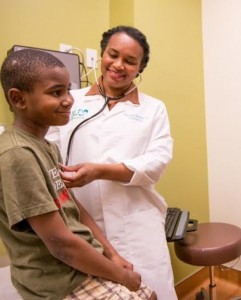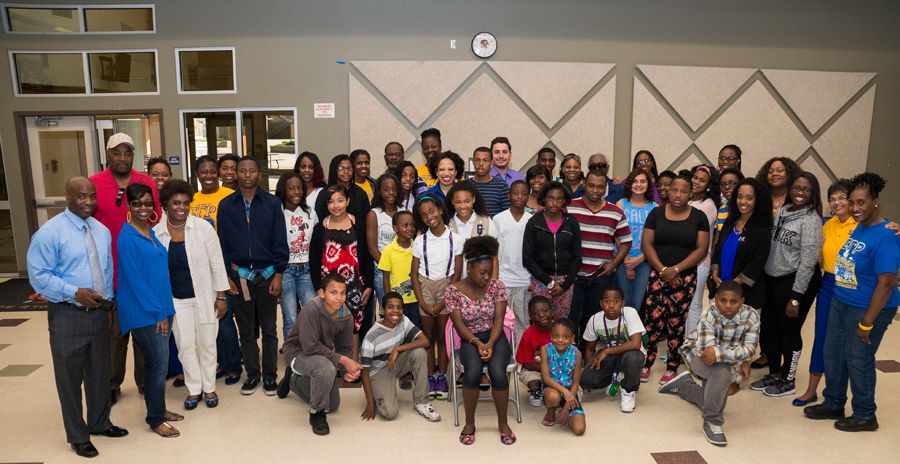 By McKenzie Jackson/California Black Media
By McKenzie Jackson/California Black Media
As far as Ronail “Stretch” Shelton knows, his health is great. Strong, athletic and fit, the Los Angeles?based personal trainer, is one of hundreds of thousands of Californians of all races who renewed or began Medi?Cal coverage this year.
Despite having a clean bill of health, Shelton, 31, who is African American, says he understands why he needs reliable health coverage.
“If something were to happen suddenly, I might not be able to afford to pay for it,” said Shelton, who is self?employed.
According to the most recent numbers, 779,000 Californians either enrolled or re?enrolled in Medi?Cal, the Golden State’s safety?net health insurance program, during its second open enrollment period. This statistic includes numbers from November 15, 2014, to January 31, 2015.
While Covered California, the state’s health exchange, has not yet released statistics concerning the number of African?American Californians who signed up for health coverage through the state program during this most recent enrollment period, Black Californians made up six percent, or 114,000, of the 1.9 million people who registered for Medi?Cal during the initial enrollment period of October 2013 to April 2014.
Medi?Cal provides low?cost health coverage for children and adults with low to no incomes and resources. The program is administered by the California Department of Health Care Services (DHCS). Under the Medi?Cal program, qualified persons receive free or low?cost health coverage. Eligibility for free Medi-?Cal is determined by household income and family size, among other requirements.
Every year the U.S. Department of Health and Human Services sets guidelines that determine whether or not families or individuals qualify for certain federal assistance programs based on their income. In 2015, according to that measure, a family of four has to earn less than $23,550 to fall below the poverty level. For an individual, that number is $11,490, and $15,510 for a family of two.
However, the State of California has its own index for determining who qualifies for Medi-Cal. According to DHCS, a family of four has to earn less than $32,913 to fall below the poverty level. For an individual, that number is $16,105, and $21,708 for a family of two.
Toni Newman, the Development and Administration Coordinator with To Help Everyone (T.H.E.) Health and Wellness Centers in Los Angeles, one of the Southside Coalition’s community health groups, said with Medi-Cal and other low-cost plans offered through the Affordable Care Act (ACA), African Americans can get affordable, even no-cost, health insurance.
“Health plans offered by Medi-Cal include benefits known as ‘essential health benefits,’” Newman told California Black Media in an e-mail.
Those health benefits include dental services, emergency services, hospitalization, outpatient services, prescription drugs, laboratory services, and children’s services such as oral and vision care. Maternity and newborn care, preventive and wellness services, chronic disease management, mental health services, substance use disorder services, and other rehabilitative devices and programs such as physical and occupational therapy are also covered by Medi-Cal insurance.
According to numbers from the Southside Coalition’s website, from 2008 to 2012 T.H.E.’s six centers and one mobile clinic in the south Los Angeles area had a patient base that is 61 percent African American. Seventy -two percent of the patients earned less than 100 percent of the federal poverty line and 43 percent were uninsured, the website also reports.
Newman said T.H.E.’s doctors and nurses are accustomed to dealing with health issues associated with the communities it serves. “Sixty percent of T.H.E. patients use Medi-Cal and most of that population are minorities,” she said. “A lot of African Americans suffer from high blood pressure and diabetes .”
At each of the centers, T.H.E. offers medical services for men, women, children, and teens, as well as public health and preventive education services.
Although enrollment for the program jumped dramatically during Covered California’s open enrollment period from November 15, 2014, to February 15, 2015, enrollment or renewal for Medi-Cal is available all year long to those who qualify, as opposed to the private health insurance plans offered through Covered California as part of the ACA – commonly known as “Obamacare”.
There are a number of ways individuals or families can apply for Medi-Cal coverage. They can sign up in person at their local county’s human services agency; visit a Covered California certified enrollment counselor; or apply by mail with a Medi-Cal Single Streamlined Application found on Covered California’s website at www.coveredca.org.
Newman said T.H.E. has 10 certified enrollment counselors who have been trained and certified by Covered California to assist uninsured patients in enrolling in Medi-Cal and Covered California plans.
For most, the renewal process is simple and straightforward. It entails requesting the Medi-Cal renewal documents from your local county human services agency. Upon receiving, the applicant must fill the forms out and send them back to the human services agency.
Shelton said getting through the renewal process was smooth even though he experienced a hiccup early on. “I didn’t get the paperwork,” he said. “So they assigned me someone that helped me get it done.”
For more information about Medi-Cal visit www.dhcs.ca.gov/services/medi-cal/pages/applyformedi-cal.aspx or call your local county human services agency, or visit Covered California’s website at www.coveredca.com or call 800-300-1506.

 Westside Story Newspaper – Online The News of The Empire – Sharing the Quest for Excellence
Westside Story Newspaper – Online The News of The Empire – Sharing the Quest for Excellence









